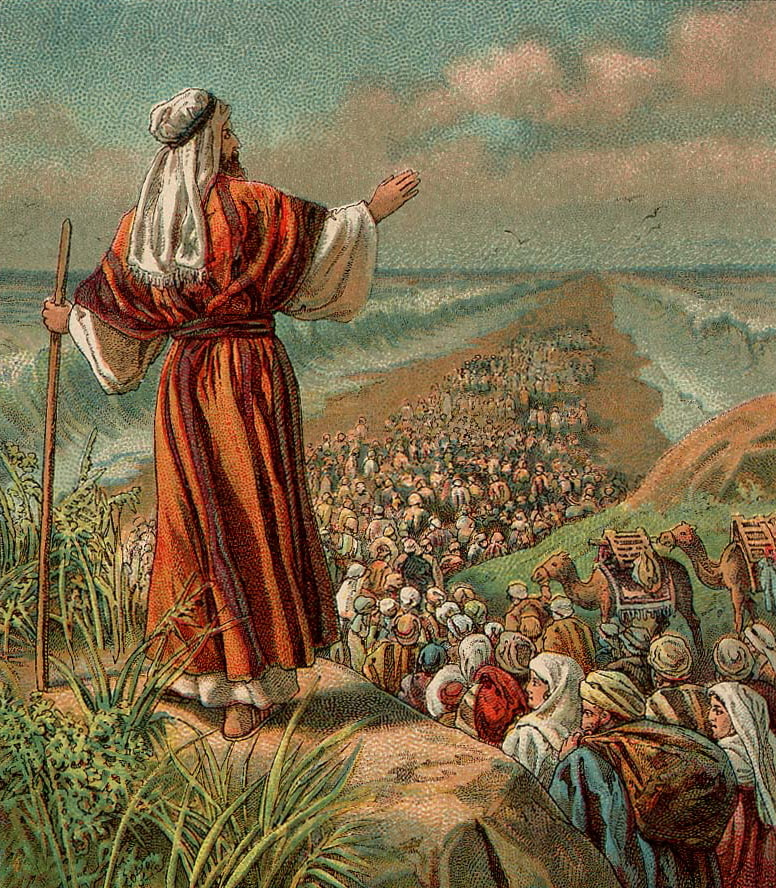|
After penning The Plagues of Egypt, and thinking ahead to the next big event in Exodus, I was lying in bed running lines in my head and came up with: From a land that is fertile to one filled with sand So, the following morning, my next poem began with those lines. And I struggled mightily with the direction it should go. And as lines and verses came and went and got moved around, these opening lines fell further from the top until they finally landed into the final stanza. As I read the passage in Exodus, I was reminded of the things I wrote in my Easter poem of 2019, Lamb Selection Day. Like, how the Israelites were to select their Passover lamb (or goat) on the tenth of the month, slaughter it on the fourteenth, put its blood on their door posts, and eat it in haste wearing their traveling clothes. By then, I was on a roll. I crammed in there how the grieving Egyptians literally begged them to leave and gave of their gold and clothing to the Israelites and how Joseph wanted his bones carried out of Egypt when they left. After I ran out of my general knowledge on this event, I was left with my "opening lines" and I wasn't sure how to wrap it all up. I thought of the previous lines I had written concerning how each successive Pharaoh knew less and less of Joseph and was harder on the Hebrews slaves because they were reproducing so rapidly. Then, I wondered how long the Israelites had lived in Egypt and found that the Bible clearly stated that is was 430 years. Except, that couldn't be possible since Moses was a great-grandson to Jacob and he had married his own aunt, who was a granddaughter to Jacob. This led me to Google the subject and I read of a controversy I wasn't even aware of — something I've never even considered. Consider the following: If Levi had conceived Jochebed on the very last day of his life, then Jochebed would have had to given birth to Moses when she was 257 years old in order to get a period of 430 years for the sojourn in Egypt (93 years that Levi lived in Egypt, plus Moses’ 80 years (Exodus 7:7) when he arrived to deliver the children of Israel—93+80+257=430). Interesting stuff. Anyway, out of all of this study the final two lines were formed. In fact, the final line was changed and fine-tuned again last night as I was writing this blog. Exodus We were told to select a young goat or a lamb,
one unblemished from out of our herd. We inquired of Moses who told us, I AM, God Jehovah was keeping his word. On the tenth of the month our selection was made; on the fourteenth it cooked in a roast. We made sure that the blood of the lamb was displayed on the frame of the door and each post. Then we ate with our sandals and cloak that we wore, and we ate with our staff in our grasp. With its meat in our belly and blood on our door, we awaited God's hand to go past. When a wailing filled Egypt, we knew in our heart that the people would beg us to leave. With their clothing and gold they compelled us depart; every family of Egypt in grief. Take my bones when you leave here, was Joseph's request, so we packed them with all that we own. We've been slaves, yet our children would be more oppressed when the next Pharaoh sat on his throne. From a land that is fertile to one filled with sand; we have miles of desert to roam. Once, the children of Israel arrived by God's hand; now, its time that his children went home. |
Copyright © 2016-2024 • The Hawk's Quill LLC
All rights reserved
All rights reserved


 RSS Feed
RSS Feed